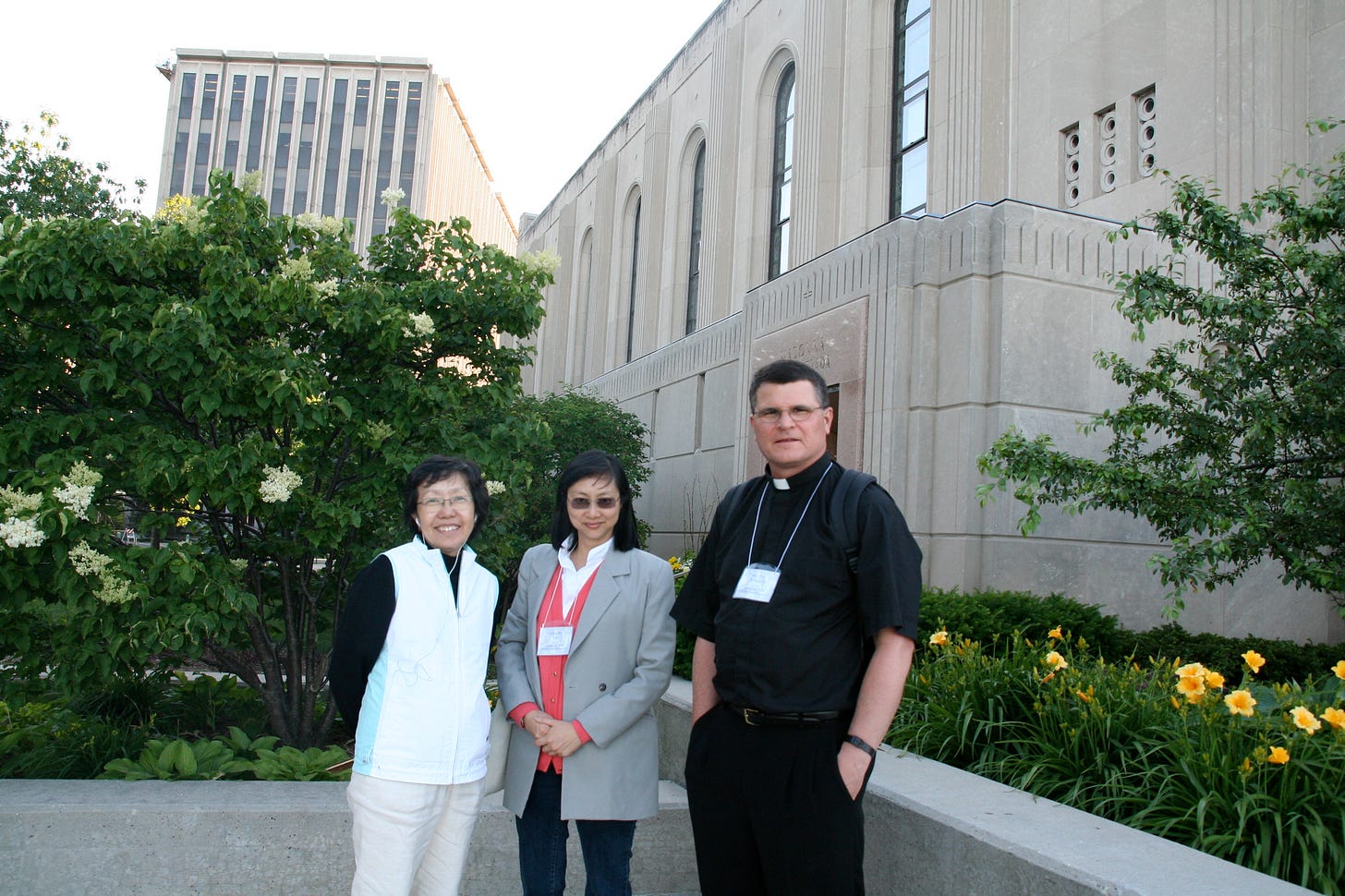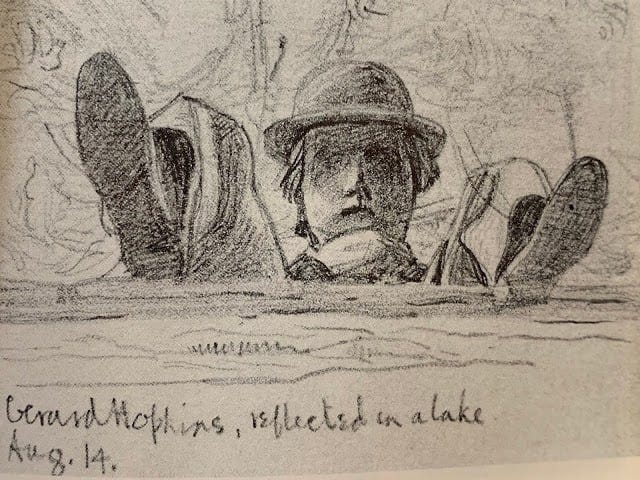HAPPY BIRTHDAY TO GERARD MANLEY HOPKINS
CONVERT, JESUIT PRIEST, POET, LOVER OF GOD AND HIS CREATION
How can I fail to mention today is the birthday of Gerard Manley Hopkins, even though the day is far spent?
The poet Gerard Manley Hopkins was born 179 years ago. In our times, Hopkins’ astonishingly original poetry is widely known and loved. But during his short lifetime, which ended when he was forty-four, his work was known only by very few.
The Dappled Things Connection
Among his other now-popular poems, Hopkins wrote “Pied Beauty,” and Dappled Things magazine got its name from a phrase in that poem. The poem begins:
"Glory be to God for dappled things" . . .
Glory be to God for both dappled things and Dappled Things, indeed.
You can read the entire poem here.
In case you don’t know, Dappled Things is a Catholic literary magazine that was created in 2005, and poet Dana Gioia has called it “the journal in which a new generation is discovering itself."
Even though at my age, I’m clearly not of the new generation, I’ve written scores of pieces for their Deep Down Things blog for about ten years (here for example). Also for several years, I posted Friday Links (for example here) and birthday posts like this one about famous writers on their Facebook page (for example here), and I’ve published interviews and essays in their print magazine, which have been also published online (for example here).
The Dappled Things blog is named Deep Down Things after another memorable phrase, this one taken from “God’s Grandeur,” another great poem by Hopkins, whose second and final stanza is this:
And for all this, nature is never spent;
There lives the dearest freshness deep down things;
And though the last lights off the black West went
Oh, morning, at the brown brink eastward, springs —
Because the Holy Ghost over the bent
World broods with warm breast and with ah! bright wings.
Below you can see the entire poem recited by Britain’s King Charles III on Easter of 2021 when he was still the Prince of Wales.
A new comic book-style adaptation of “God’s Grandeur” is downloadable for free if you enter your email address here.
Some people call Hopkins difficult, but I have to disagree. As the above examples and the one below prove, his poems show up in popular culture in places that aren’t the exclusive domain of intellectuals. For example, in this clip from the TV show The Waltons, which aired December 13, 1973, the character John Boy read Hopkins’ poem The Windhover to his mother on her birthday.
My Mariani Connection to Hopkins
Eighty-three-year-old writer Paul Mariani is the author of nine poetry collections and many prose books, including biographies of several poets, including William Carlos Williams, Hart Crane, Robert Lowell, Wallace Stevens, John Berryman—and Gerard Manley Hopkins. I came to learn about Mariani’s biography of Hopkins and more than I’d ever known about the poet’s life before in a roundabout way through my acquaintance with his son Paul Mariani, S.J.
Father Paul Mariani, although he has the same first name as his father, is not a Jr. He is a well-respected historian of China who teaches at Santa Clara University. I met him in June 2007 at a Church Music Association of America colloquium in D.C. that we both attended, and he enjoyed some photos I took of him while I was photographing everyone who attended. The gallery is here.
Father Paul Mariani speaks with two Chinese women at the 2007 CMAA Colloquium in D.C.
Later, I read Father Mariani’s excellent book Church Militant: Bishop Kung and Catholic Resistance in Communist Shanghai (2011) about the courageous actions of Ignatius Kung who was made bishop of Shanghai after the Communists took over China, and I wrote about it in, “What We Can Learn From Shanghai's Oppressed Catholics” and in “Bishop Kung Was Tricky That Way, and Other Stories of the Saintly, Stubborn, Persecuted Ignatius Ping-Mei Kung of Shanghai.”
I met Fr. Paul's poet father and his mother briefly when they were at the Mission Santa Clara Chapel at Santa Clara University (SCU) for their son's Jesuit vows on Candlemas 2010. I took photos of the event for Father Mariani that night and made a gallery which I posted here.
A few days later, Paul Mariani the poet gave a talk in an upstairs meeting room in the SCU library about Gerard Manley Hopkins. I took his biography out of the library that night on my way out.
That talk and the biography by Mariani are how I learned how dismal and short a life Hopkins had, how he was assigned to a small university in Dublin that he hated, was plagued with depression and with migraines from endless grading of papers from unknown students of other professors, and how his poetry was barely known in his lifetime, and almost was never published at all.
Hopkins was a Catholic convert who was received into the Church by St. John Henry Newman and who converted knowing that he would alienate his family; his tutors and his peers would deplore his gullibility, and he would be blocked from almost every avenue of worldly advancement, including the possibility of a professorship at Oxford where he was studying.
Hopkins gradually had became convinced that because the line of succession of Anglican orders was broken after they separated from Rome, and their priestly ordinations were therefore invalid, when the words of consecration were pronounced by an Anglican priest, transubstantiation did not occur. Most Anglicans believed that the bread and wine were only symbols anyway. But Hopkins intensely desired both the doctrinal certainty and the partaking of the Real Presence of Christ more than anything. He felt the whole of true Christian belief is anchored on that reality, and the only place he could find and receive Christ's Body and Blood was the Catholic Church.
Unless otherwise noted, the following quotes are from poet Paul Mariani's biography of Hopkins. (Buy it if possible, but if not you can read it for free at the Internet Archive here.)
“The truth, the one ‘great aid to belief and object of belief,’ the underpinning of it all, came down to the fact of the real presence of God in the Blessed Sacrament.”
And he couldn’t ignore the Catholic Church’s belief in the primacy of Peter.
Nor is he converting for aesthetic reasons, for in that case the Church of England would win hands down. Now he is going over because of the sheer logic of the thing, where the plain reading of a Gospel passage, like “Thou art Peter” would be sufficient reason for converting.
Hopkins then felt called to join the Jesuit order. He struggled with fears that his poetry was too selfish a pursuit and incompatible with his priestly vocation, and he burned all his early poems. He later began writing poems again in obedience to a superior, and he left all his poetry with his friend Robert Bridges, who loathed Catholics, despised the Jesuits, and didn’t think well of Hopkins’ poems.
Hopkins died on June 8, 1889, of typhus. In his last days, he expressed relief that his sickness had relieved him of the grueling task of continuing to grade the latest pile of papers, even though there’d be “devil to pay” once he recovered and had to catch up with the undone work.
On the day he died, one of the priests making his rounds “heard Gerard talking to himself. . . . ‘I am so happy,’ he hears him whispering over and over. ‘I am so happy. I am so happy.’” One cannot help but think that even though he was probably happy mainly because he knew he would soon be with God, he was probably happy also that he wouldn’t have to grade those piles of papers any more.
I think it’s outrageous that Robert Bridges who by that time was poet laureate of England, didn’t publish Hopkins’ poems for thirty years, and when he did, he prefaced the volume with an apology about what he saw as the poems’ ineptness. But God’s timing is not our timing, and, besides, who remembers Robert Bridges’ poetry any more anyway?
Glory be to God for Hopkins and for how his poetry has survived to delight and inspire so many of us, and for all other such wonderful dappled beings as he was.
Incidentally, one charming thing I also learned from the Mariani talk is that when Father Paul was a baby, sometimes when his mother would go on an errand, she would bring him into his dad's office for babysitting. He would be propped up in one of those old-style plastic baby recliner things, which were propped up with flimsy chrome legs. And there he would sit while his father would read Hopkin's poetry to him.
I suspect that Hopkins the poet quite probably inspired baby Paul to follow Hopkins the priest into the Jesuit order when he grew up. And that, I believe, is how Hopkins helped us Catholics get one of the good Jesuits it has been my pleasure to come across.
The Importance of Being Gerard Manley Hopkins
Here’s one indication of Hopkins’ importance in the history of Christian poetry. Poet Dana Gioia wrote in his Foreword to "The Gospel in Gerard Manley Hopkins: Selections from His Poems, Letters, Journals, and Spiritual Writings,” about how Hopkins' poetry restored the tradition of Christian poetry when it was foundering in the middle of the Victorian era because of the prevalent agnosticism of the times.
"Not coincidentally, it was during that moment of growing religious skepticism and spiritual anxiety that Hopkins appeared to transform and renew the tradition of Christian poetry. Consequently, he occupies a strangely influential position in the history of English-language Christian poetry. His audaciously original style not only swept away the soft and sentimental conventions of nineteenth-century religious verse, it also provided a vehicle strong enough to communicate the overwhelming power of his faith. His small body of work – hidden for years – provided most of the elements out of which modern Christian poetry would be born."—Dana Gioia from Singing God’s Grandeur: The All-or-Nothing Life of Gerard Manley Hopkins









"Golden groves unleaving..." GMH knows God as well as one could hope this side of the horizon. Thanks for remembering him, Rosanne.
Dear Roseanne, Thank you so much fore this piece on Fr. Hopkins. I thoroughly enjoyed it. Blessings on your work as you fare forward. Paul Mariani (Sr.)